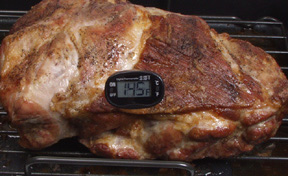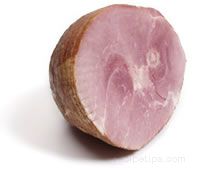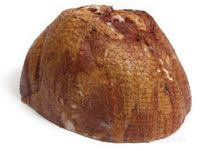Iberian pigs live under large oak trees that are found in the mountain forests of southern Spain. Their diet consists primarily of the acorns deposited by the trees. It is this acorn diet that contributes to the unique flavor of the ham.
Salt is used to cure Iberian ham, drawing the moisture from the meat as the ham is air dried. The ham is preserved through dehydration. Iberian hams are often dried in cool cellars for as long as 24 months.
Although nearly one-third of the composition of Iberian ham is fat, a large portion of the fat content tends to be of the healthful monounsaturated type found in foods such as olive oil. The fat contributes to the wonderful flavor of the ham; a flavor that is intense, yet mild. The ham also has a pleasing aroma and a coarse texture. It is served in thin slices similar to prosciutto and should be allowed to remain at room temperature for 10 to 15 minutes prior to eating, which allows the full flavor of the ham to be experienced. The ham is used as an appetizer, in sandwiches, or to complement other foods. Iberian ham is also known as Jamon Iberico.

















